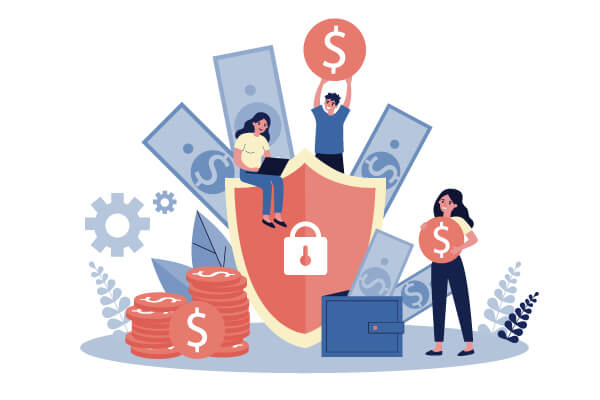Jun 23 2021 / Round the Table Magazine
READ 00:12:32
Ideas for being a better advisor
Topics Covered
Your personality as a marketing asset
Being true to my core values, I created a marketing campaign that focused on women and their historic financial inequities. However, I didn’t get the idea by paying a marketing company, but from receiving many compliments on a vintage dress. This idea came to me by being me. I sat on my desk, had my assistant take a photo of me clad in polyester, then posted it on Facebook and LinkedIn with this caption: “Did you know that the original owner of this 1960s sheath dress couldn’t get a credit card in her own name until 1974? The future is female.” Within the hour of my initial post, my social media blew up.
—Charlene Marie Quaresma, Portland, Oregon, USA, 4-year member
Maintaining health during a pandemic

Play and regular doses of fun keep us healthy. Research has shown that play, especially outdoor play, is associated with a stronger autoimmune system, resistance to allergies and better overall health. Research suggests that laughter promotes the diaphragmatic breathing — diaphragm fluttering up and down at a very quick rate — necessary to create a strong negative pressure and increased flow within the largest lymphatic vessel in the body. This increased flow of lymphatic fluid means more lymph is passing through lymph nodes, which itself means that more immune cells are produced.
—Andrew May, CEO and founder of StriveStronger
Content gives people the ability to develop an opinion about who you are and what you do. If you go to a party and you don’t say anything, people will have a hard time developing an opinion about you.
—John Henry, entrepreneur, investor and co-CEO of Loop
Helping widows navigate their finances
Widows are often seen as easy prey by unscrupulous individuals who are inclined to take advantage of their inheritance. Be sure to warn your client about avoiding these predators and offer your services to screen any and all offers that may come her way before she makes any commitments or decisions.
—Laura H. Mattia, Ph.D., CFP, academic researcher
3 steps to becoming a critical illness insurance specialist
1. Knowledge
2. Belief
3. Passion
The first step is knowledge. You need to understand the product, you need to read the literature, you need to get some claims statistics and understand when a claim would be paid and when it would not be paid. Knowledge is power when you’re talking about critical illness insurance.
You then need belief, and belief comes from ownership. You need to carry your own critical illness insurance policy, assuming you qualify.
The final thing is passion: passion for the product itself. Passion comes from handling claims. You’ll only handle claims if you sell enough of the product, and passion is when you realize the power of what we do for people, and our belief is elevated even more.
—Bhupinder S. Anand, ACII, Dip PFS, London, England, UK, 25-year member
Boosting sales through webinars

Good webinars can be a little like independent movies: They leave you feeling wonderful, inspired and ready to take on the world. Keep your webinar to 60 minutes. Find the interesting topics and enhance them by inviting other experts to your webinars.
—Miliana Marten, CFP, Jakarta, Indonesia, 12-year member
Planning the ideal week

One of the decisions I made when I started having a family is that I needed to create boundaries for myself. The only way for me to create boundaries is to organize my calendar way in advance; I’m talking about a full year, year and a half in advance. I started to build what’s called the ideal week: I see clients on Tuesdays, Wednesdays and Thursdays, and Mondays are a prep day and for getting ready for the week and taking a look at what’s going to happen. Fridays are really the catch-up day with my team to go over any planning that needs to be done for the following week.
This allows us to block out the days and the weeks that we’re not working. We block out our vacations, special days, my birthday, my wife’s birthday and anniversaries.
—Barjes R. Angulo, LUTCF, RICP, New York, New York, USA, 13-year member
Involve the children in family business planning
Quite often, the senior generation wants to dictate how their kids are going to take over the business. They meet with their financial planner, attorney, CPA, and they put together a plan for their kids to implement.
The problem is the kids are not part of that equation. They didn’t participate in the planning. They feel it’s being crammed down their throats. You’ve got to let them participate in the system. Then you can suggest to your clients that the kids — the next generation — should participate in these discussions because if they participate, they take ownership.
Clients will sometimes have a hard time picking between this child and that child. But if the kids do it themselves, if they come up with their own plan of how they’re going to operate the business — and sometimes you, the advisor, can be the facilitator — that is a plan that will stick. It’s a plan that the parents simply have to endorse. The advantage of this bottom-up planning is that the children are participating. They’re building an agreement between them as to how this is going to be done.
—James S. Aussem, J.D., AEP, shareholder in Cavitch Familo & Durkin Co. and co-chair of the Business Practice Group
Creating a third space for transitions

Your day is made up of moving between different spaces. The first space is what you’re doing now. The second space is what you’re about to do. You might be doing admin at your desk, and all of a sudden, you’ve got to solve some sort of crisis or some sort of problem. Or you might be going from an interaction with a client that’s really stressful, and they’re taking things out on you and then you’ve got to meet with a new client and you’ve got to be at your best to get them to come on board in the business. You have days spent moving between these spaces. What I want you to start to consider in your workday, in between meetings, in between interactions, is how do you use that transitional gap, that third space, to show up a little bit better.
—Adam Fraser, Ph.D., human performance researcher and consultant
Make goals out of what you want, not what you don’t want
Many of us spend time thinking about what we don’t want: We don’t want to be broke. We don’t want business to be so hard. We don’t want to be out of shape. We don’t want our relationships to be bad. In thinking about what we don’t want, what we’re doing is giving our focus and attention to those very things that we don’t want to come true. Studies have shown those who take the time to sit, think, write goals, dream goals, have vision boards, whatever it is that you actually want to do, have a massively higher propensity to achieving them than those who don’t. Clear, concise goals make it easier to know when you’re on track to hitting them.
—David Braithwaite, Dip PFS, Kent, England, UK, 13-year member
Success is not about how many people know you. Success is how well you know yourself. And don’t forget that on the road to success it’s always we, it’s not me.
—Muniba Mazari, artist, model, activist, motivational speaker, singer and television host
Explaining inflation to clients

I like to show clients a 50-year-old U.S. postage stamp. A first-class stamp cost just 6 cents back in 1971. Today, that same stamp will cost you 55 cents. This is about 4.5% and is a bit higher than overall consumer inflation, but it is a great example and is immediately embraced by the client. This is a simple, fun and memorable way to communicate this to clients. The question for clients becomes: How much will stamps cost in 50 years and what is your plan to pay for them? Because it’s highly likely that 55 cents will buy only a fraction of a stamp in the future.
—Richard Dobson Jr., CFP, Cedar Falls, Iowa, USA, 19-year member
Be strategic and authentic
A good intelligence strategy will underpin the value of your advice. Now, more and more, it’s your advice that is so valuable. People can run to Google; they can run to websites. There are thousands of ways of getting the job done. But the value of the advice that you bring will provide the competitive advantage to your clients, to the industry and — above all — to yourself. It also enhances your authenticity, your brand, your impact. People like somebody who’s a bit different.
—Rodger N. Harding, LLB, business transition, leadership and strategy development consultant
Create a soothing environment

I have a dog named Gemma. She’s about 9 years old and a certified therapy dog. Therapy dogs have been proven to be very calming. We’re talking to our clients about the bad things in life: When you’re not here anymore, when your so-and-so passes away, when you’re coming in because someone did pass away and now we have to do the paperwork. It’s been proven that if you can pet a dog, that it’s very soothing and very calming — and the clients really do like it. If you’re going to do this, make sure it’s a trained dog. A therapy dog is trained to not jump, not bite, not bark and not scratch. They are trained to just literally lie there and get pet.
—Terri E. Krueger, Syracuse, New York, USA, 7-year member
Put a positive spin on the future

In our industry, we’re able to rattle off the percentage chance of a death or critical illness or disability to our clients. To create a more positive experience, I flipped the statistics. Rather than telling a prospect that they had a 7% chance of dying and a 22% chance of critical illness before 65, I would explain to the client what those odds meant is that they actually had a 93% chance of being alive and a 78% chance of being healthy into retirement.
On the surface, it seems like I had just talked the prospect out of seeing the need for insurance at all. Instead, I was now positioning insurance in a more positive way. I was advising clients that we need to prepare for the most likely scenario, that they would be alive and healthy into retirement and retiring income, state taxes, family succession and legacy funding needed to be addressed. It makes little sense for the least-likely events to occur and not for the most likely.
—Chris George, CFP, TEP, Vancouver, British Columbia, Canada, 8-year member
Let’s not jump to conclusions
Empathy really showed up during the pandemic. We got a glimpse into people’s homes. We saw their kids running around. If somebody had a performance issue or they showed up late to a meeting, we didn’t immediately assume that they were lazy. We immediately thought about other things, like maybe they’re dealing with issues at home with the kids. Maybe there’s something happening. Maybe there’s a family member who’s sick. We immediately had empathy and thoughts that there were other things going on in their lives.
We should be doing that all the time. Prior to the pandemic, I think we were quick to judge, quick to draw conclusions. I hope that we’ve all practiced empathy over this time and continue to practice it when we’re out of the pandemic.
—Simon Sinek, Speaker and author
Navigating in tough times
Our clients who stayed with us during the pandemic, during the stock market crisis, have come out of it better off than if they’d left during the bottom of the market. We let clients know that there are no certainties, but they will learn safely because we know what we’re doing. We’re like a trained pilot. We’re experts. We’re going to get them to their destination. Sometimes it’s sooner; sometimes it’s later.
—Andrew William Maher, Stratford-upon-Avon, England, UK, 6-year member
Using change to your advantage
The only thing we can control is not change itself, but how we respond to or react to said change. Think of a change as nothing more than a tidal wave. If a tidal wave is coming toward you, you cannot stop that fact; you can simply choose how you respond to or react to that fact.
Let’s look at our choices. Choice one is to let the tidal wave wash straight over you, leaving you in whatever condition it chooses. Choice two, pull out a surfboard, have a boatload of fun. Choice three, use said tidal wave to fuel — like a generator — the next chapter of your existence. You cannot stop the fact that change is coming. Don’t let the changes wash straight over you. Think about how you can have fun with what’s happening right now and how can you use what’s happening right now to fuel the next chapter of yours and your client’s existence.
—Phil M. Jones, speaker and author
Security sets you apart

We lose our way when we try to sell insurance and annuities as investments. Because if we do it that way, then we have competition: stocks, bonds, real estate, gold, silver, Bitcoin. Now we have real competition. When we guarantee that they’ll never be poor, when we show them that we have guarantees, we have no competition. There’s nobody else who can do what we do.
—Van Mueller, LUTCF, Brookfield, Wisconsin, USA, 33-year member
Often, your strengths and weaknesses are facets of the same things. I can be creative; I can also be disorganized. I can be motivated; I can be obsessive. What of your strengths are also a weakness? The cost of entry for a strength is the weakness that comes with it.
—John K. Coyle, Olympic silver medalist and founder of Design Thinking Academy
Let the client do your marketing

A couple of years ago, I started saying to the team, “What we’re going to do after every meeting is ask a crazy question: ‘Mr. and Mrs. Client, why do you deal with us? Is there anything that makes us a little bit different or a little bit special?’ And just be quiet and let them answer the question and then say goodbye, go into the next room, and scrawl out what they just said, in their own words — which is really, really important.”
Before long, the whole back office was covered in 20 sheets of paper stuck to the wall. We completely reformed what we wer e doing. If you follow that exercise, that will help you have the words for your website or your material that really resonates with your target market. It really helped us clarify and bring simplicity. Why say in a sentence what you can say in two or three words? It radically changed what we do.
—Austyn Anthony Smith, Dip PFS, London, England, UK, 17-year member

![Elevating your financial advisory journey: how the right mentor can propel your success to new heights [Surabhi Chaudhary]](https://www.mdrt.org/globalassets/digizuite/32702-en-updated_-india_video-interview_surabhi-chaudhari-thumbnail.png?height=268&crop=0,0,268,268)

![Beyond finance: Individuals outside the financial profession every financial advisor should learn from [Nirmal Debnath]](https://www.mdrt.org/globalassets/digizuite/32634-en-india_written-interview_nirmal-debnath-thumbnail.jpeg?height=268&crop=0,0,268,268)
![How to tailor financial advice to fit the unique needs and goals of your clients [Merryl Baptista]](https://www.mdrt.org/globalassets/digizuite/32635-en-india_written-interview_merryl-baptista-thumbnail.jpeg?height=268&crop=0,0,268,268)
![Anticipating the financial needs of Gen Z clients and advising prospects towards adequate insurance cover [Komal Atal]](https://www.mdrt.org/globalassets/digizuite/32632-en-india_written-interview_komal-attal-thumbnail.jpeg?height=268&crop=0,0,268,268)
![Enhancing your offline persona through cultivating an online presence: Tips and strategies [Khushboo Bajaja More]](https://www.mdrt.org/globalassets/digizuite/32630-en-india_written-interview_khushboo-bajaj-more-thumbnail.jpeg?height=268&crop=0,0,268,268)
![A former flight attendant's sky-high client servicing standards [Beth Daffodil Uy Tan]](https://www.mdrt.org/globalassets/digizuite/32577-en-ph-_video-interview_a-former-flight-attendant's-sky-high-client-servicing-standards_daffodil-tan-thumbnail.png?height=268&crop=0,0,268,268)



![Overcoming a financial advisor’s internal self-doubts [Cedrick Cruz]](https://www.mdrt.org/globalassets/digizuite/32509-en-ph_written-interview_-handling-a-financial-advisors-self-doubts-cedrick-cruz-thumbnail.jpg?height=268&crop=0,0,268,268)